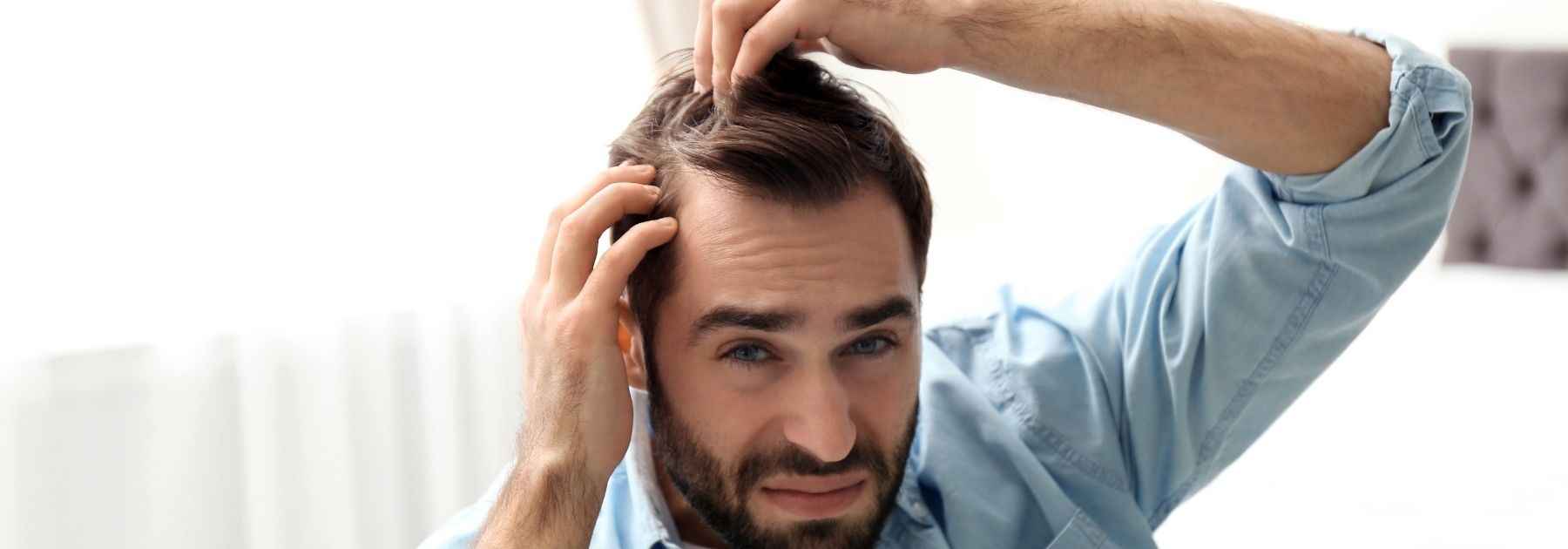Creatine is one of the most popular and widely used supplements in the fitness world. From professional athletes to casual gym-goers, many people use it to help improve strength, muscle growth, and workout performance. But there’s one question that often comes up—does creatine cause hair loss?
At Townhead Pharmacy, we regularly speak to patients about male hair loss and common concerns around lifestyle or supplement use. If you’re worried about whether creatine could be contributing to thinning hair, here’s what the science really says.
What Is Creatine?
Creatine is a natural substance found in muscle cells. It helps your body produce energy during high-intensity exercise, particularly short bursts like lifting weights or sprinting.
You can get creatine from certain foods, like red meat and fish, but it’s more commonly taken as a powdered supplement, especially by people trying to build muscle or improve gym performance.
Creatine is well-researched, widely used, and generally considered safe for most healthy adults when taken correctly.
Where Did the Hair Loss Rumour Come From?
Concerns about creatine and hair loss started back in 2009, when a small study involving rugby players found that creatine supplements led to an increase in DHT (dihydrotestosterone) levels.
DHT is a hormone linked to male pattern baldness, the most common cause of hair loss in men. It’s a byproduct of testosterone and can cause hair follicles to shrink, eventually leading to thinning and hair loss in genetically susceptible individuals.
The study didn’t directly show that the participants lost hair—only that their DHT levels rose slightly during creatine use. Since then, the link between creatine and hair loss has become a popular talking point online—but the evidence remains limited.

Does Creatine Actually Cause Hair Loss?
Let’s break it down:
- –> The 2009 study was small (just 20 participants) and hasn’t been replicated on a larger scale
- –> No participants in that study experienced visible hair loss during the trial
- –> No other studies since have confirmed a direct link between creatine and hair loss
- –> Most research shows creatine is safe and well-tolerated with no mention of hair loss as a side effect
So, while creatine may temporarily influence hormone levels, there’s no strong evidence to say it directly causes hair loss.
That said, if you’re already predisposed to male pattern baldness, any increase in DHT could, in theory, speed things up—but this hasn’t been clearly proven.
What Actually Causes Hair Loss in Men?
The most common type of hair loss in men is androgenetic alopecia, also known as male pattern baldness. It’s caused by a combination of:
- –> Genetics
- –> Hormonal factors (especially DHT)
- –> Age
Hair loss usually starts at the temples or crown and progresses gradually over time. It’s not caused by creatine alone—but genetics and hormonal changes play a major role.
Other potential triggers include:
- –> Stress
- –> Poor diet or nutrient deficiencies
- –> Certain medications
- –> Underlying health conditions (e.g., thyroid issues)
If you’re noticing hair thinning or a receding hairline, it’s worth speaking to a healthcare professional to rule out other causes.
Should You Stop Taking Creatine?
If you’re taking creatine and noticing hair changes, you might be tempted to stop. But it’s important to ask:
- – Are you genetically prone to hair loss?
- – Were the signs already starting before you began supplements?
- – Are there other factors—like stress, illness or diet—playing a role?
If you’re not sure, it might help to pause the supplement for a few weeks and monitor changes—or speak to a pharmacist or GP for advice.
For most men, creatine is unlikely to be the root cause of hair loss—but monitoring how your body responds is always sensible.
Can You Treat Hair Loss Safely?
Yes. If you’re experiencing hair loss and want to take action, there are effective options available. At Townhead Pharmacy, we offer treatments including:
- –> Regaine for Men – a topical foam or solution containing minoxidil, applied to the scalp to stimulate hair growth and slow thinning
- –> Finasteride – a prescription tablet that works by reducing DHT levels in the scalp (available via consultation)
These treatments are widely used and clinically proven to help manage male pattern hair loss when used consistently over time.
Need Advice on Hair Loss or Supplements?
At Townhead Pharmacy, we understand how worrying hair loss can be. Whether you’re using creatine, noticing early signs of thinning, or just want to know your options, our team is here to help.
We offer confidential advice and access to regulated hair loss treatments like finasteride, with the option to order online through a simple consultation.

Our Final Thoughts
So—does creatine cause hair loss? Based on current evidence, the answer is: probably not. While it may influence hormone levels slightly, there’s no solid proof that creatine causes hair loss directly.
If you’re concerned, consider speaking to a healthcare professional, especially if you have a family history of male pattern baldness. And if you’re looking for support with hair loss, we’re here to help.
Visit Townhead Pharmacy today to learn more about hair loss treatments or speak to our team for honest, expert advice.

This blog was written on behalf of Townhead Pharmacy by Pharmacy Mentor.

